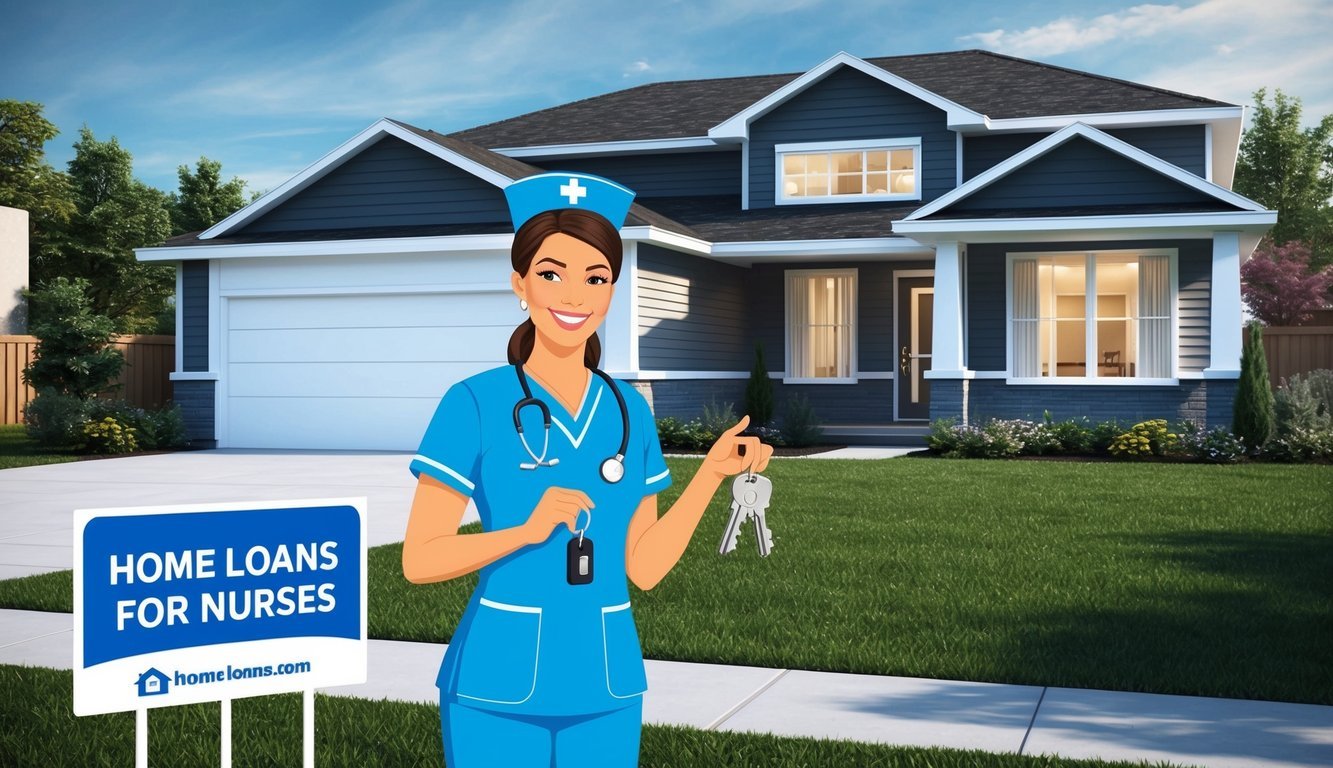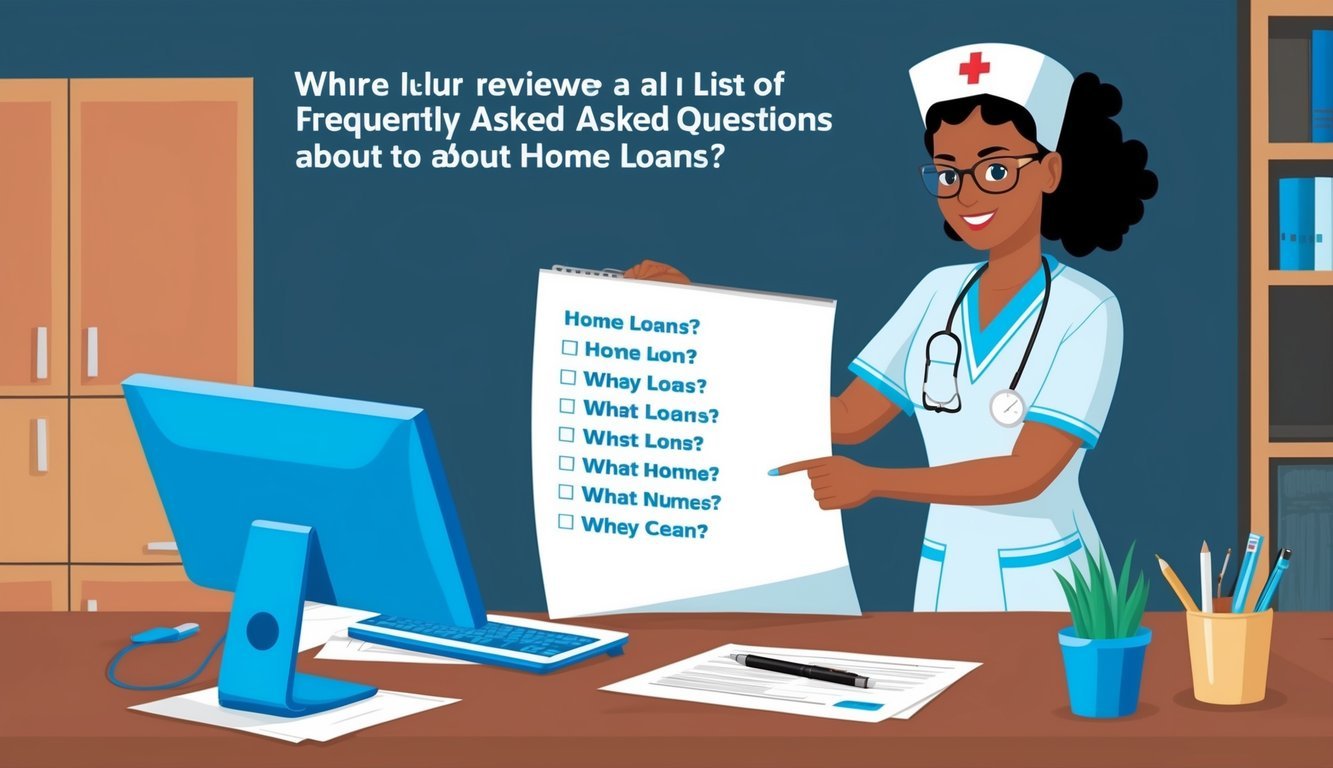If you are a nurse looking to buy a home, you may be pleased to know that there are specific loan programs designed just for you. These programs often offer lower fees, grants, and even down payment assistance to help you achieve homeownership more easily. With your vital role in healthcare, accessing these financial resources can make a significant difference in your home-buying journey.
Understanding the various options available is important.
From Federal Housing Administration (FHA) loans to specialized programs such as the Hero Home Program, each offers unique benefits that cater specifically to healthcare professionals.
Knowing how to navigate these programs can help you save money and time, allowing you to focus on what truly matters: providing care to your patients.
Exploring home loans tailored for nurses opens doors to homeownership that you might not have considered before.
With the right information, you can find the perfect program that aligns with your financial situation and goals.
Key Takeaways
- There are loan programs specifically designed for nurses that offer financial support.
- Understanding qualification criteria can help you secure the best loan options.
- Researching different types of homes and locations can lead to better investment choices.
Understanding Home Loans for Nurses
Home loans for nurses offer unique benefits tailored to healthcare professionals.
These loans can help you achieve homeownership through various options, including conventional and government-backed loans.
Key factors like your credit score and history will play a significant role in your loan approval process.
The Role of Credit Score and History
Your credit score is crucial when applying for a home loan.
Lenders use it to assess your ability to repay the loan.
A higher score can lead to better interest rates and more favorable loan terms.
Key Credit Score Ranges:
| Score Range | Classification | Implications |
|---|---|---|
| 300-579 | Poor | Limited loan options |
| 580-669 | Fair | Higher rates, fewer options |
| 670-739 | Good | Better rates and terms |
| 740+ | Excellent | Best rates and terms |
Your credit history also matters.
It shows your borrowing habits and reliability.
Make sure to check your credit report for any errors before applying.
Conventional vs. Government-Backed Loans
When exploring home loan options, you may come across conventional loans and government-backed loans.
Understanding their differences is vital for making the best choice.
Conventional Loans:
- Typically require higher credit scores.
- Often require a 20% down payment to avoid private mortgage insurance (PMI).
- Interest rates may be lower for borrowers with excellent credit.
Government-Backed Loans:
- FHA Loans from the Federal Housing Administration have more flexible credit guidelines and lower down payment options.
- VA Loans are available for veterans and active-duty military personnel, offering no down payment and no PMI.
- USDA Loans focus on rural properties and are intended for low-to-moderate income borrowers.
Each type of loan has its benefits depending on your financial situation and career.
Financial Support and Incentives
You have various financial support options and incentives when looking for home loans as a nurse.
These include down payment assistance, grants, and specialized loan programs that cater to your unique needs.
Down Payment Assistance and Grants
Many home buying programs offer down payment assistance to help you manage the initial costs.
For instance, the Nurse Next Door Program provides significant aid, offering up to $15,000 in down payment assistance and grants up to $8,000 for closing costs.
Here are some popular options for down payment assistance:
| Program | Assistance Type | Amount Available |
|---|---|---|
| Nurse Next Door | Grants | Up to $8,000 |
| Homes for Heroes | Closing Cost Credits | Varies |
| State-Specific Grants | Down Payment Assistance | Usually $2,500 – $10,000 |
These funds can ease your financial burden, making it easier to achieve homeownership.
Specialized Home Loan Programs for Nurses
Specialized loan programs such as FHA loans and conventional loans from Freddie Mac can benefit you as a nurse.
FHA loans require a lower credit score and a down payment as low as 3.5%.
Organizations like Homes for Heroes help healthcare professionals save on fees, offering discounts on lender fees and closing costs.
You can save an average of $2,300 through their network of real estate specialists.
The Nurse Next Door Program and similar initiatives provide affordable financing options tailored to your profession.
These programs support first-time homebuyers seeking to turn their dreams into reality while minimizing out-of-pocket expenses.
Loan Costs and Additional Fees
When considering a home loan, it’s crucial to understand the costs involved beyond just the purchase price.
Two significant areas include closing costs and mortgage insurance premiums, as well as the long-term costs associated with different types of mortgages.
Closing Costs and Mortgage Insurance Premiums
Closing costs typically range from 2% to 5% of the loan amount.
These costs cover various fees including appraisals, title searches, and attorney fees.
Here’s a quick breakdown of common closing costs:
| Cost Type | Percentage of Loan Amount |
|---|---|
| Appraisal Fee | $300 – $500 |
| Title Insurance | 0.5% – 1% |
| Attorney Fees | $500 – $1,500 |
| Recording Fees | $50 – $150 |
In addition to closing costs, you might need to pay Mortgage Insurance Premiums (MIP) if you’re using an FHA loan.
This is particularly relevant if your down payment is less than 20%.
MIP can be included in your mortgage payments or paid as an upfront fee, affecting your overall loan cost.
Long-Term Costs: Fixed-Rate vs. Adjustable-Rate Mortgages
When selecting a mortgage type, your choice between a fixed-rate mortgage and an adjustable-rate mortgage (ARM) can impact long-term costs.
A fixed-rate mortgage offers stability with the same interest rate throughout the loan term, making budgeting easier.
In contrast, an ARM typically starts with a lower rate, which can change after a set period.
This may lead to lower initial costs but can increase later.
Consider this comparison:
| Mortgage Type | Initial Rate | Rate Adjustment Terms |
|---|---|---|
| Fixed-Rate Mortgage | Higher | Stays the same |
| Adjustable-Rate Mortgage | Lower | Changes after fixed period |
Understanding these costs can help you make informed decisions, ensuring you choose the right loan for your financial situation.
Qualification Criteria and Application Process
When applying for a home loan, it’s essential to understand the key factors that lenders consider.
This includes your debt-to-income ratio and documentation requirements.
Additionally, working with mortgage specialists can help navigate the application process smoothly.
Assessing Debt-to-Income Ratio and Employment Stability
Your debt-to-income (DTI) ratio is a crucial factor in the loan qualification process.
Lenders typically prefer a DTI ratio below 43%.
This means your monthly debt payments, including your mortgage, should not exceed 43% of your gross monthly income.
For nursing professionals, stable employment is vital.
Many lenders look for at least two years of work history in your field.
This stability shows that you have a reliable source of income to manage your mortgage payments.
If you have student debt, include it in your DTI calculation.
The higher your DTI, the more challenging it may be to qualify for a conventional mortgage.
Submitting Documentation and Working with Mortgage Specialists
During the application process, you will need to submit various documents.
Common requirements include:
- Proof of income: Pay stubs, W-2 forms, and tax returns.
- Credit report: A good credit score is often necessary. Aim for a score of at least 580 for FHA loans or higher for conventional loans.
- Employment verification: A letter from your employer may be needed.
Working with mortgage specialists can simplify this process.
They can help you gather the necessary documentation, explain different loan options, and guide you through each step.
Experts can also provide insights on any special programs available for healthcare workers, potentially making home buying easier.
Considering the Location and Type of Home

Selecting the right location and type of home is crucial for nurses.
It affects your daily commute, lifestyle, and homeownership costs.
Understanding available loan options can help you make informed decisions.
Rural vs. Urban: USDA and FHA Loan Options
When choosing between rural and urban areas, consider how loan options differ.
The USDA loan is designed for rural properties and offers benefits like zero down payment and lower mortgage insurance costs.
It is ideal if you aim for a home in a less populated area.
FHA loans, on the other hand, cater to both rural and urban settings.
They allow lower credit scores, making homeownership accessible.
With an FHA loan, you could secure a home with a down payment as low as 3.5%.
This is beneficial in urban areas where home prices may be higher.
| Loan Type | Location | Down Payment | Credit Score Requirement |
|---|---|---|---|
| USDA Loan | Rural Areas | 0% | Varies |
| FHA Loan | Rural & Urban | 3.5% | As low as 580 |
Choosing the Right Home for Your Professional and Personal Needs
Your home should align with your career and lifestyle.
If you work long hours, consider a house closer to your workplace to reduce commute time.
Look for neighborhoods with good access to hospitals or clinics where you might work.
Think about your personal needs as well.
Do you plan on starting a family or working from home? A home with additional rooms can provide space for those needs.
Explore financing options tailored for nurses, such as FHA loans for nurses or VA loans.
These can provide you with favorable terms that suit your budget and lifestyle.
Frequently Asked Questions

In this section, you will find detailed answers to common questions about home loans available for nurses.
These answers cover eligibility criteria, the impact of credit scores, available programs in specific states, and options for first-time homebuyers.
What are the criteria to qualify for the Nurse Next Door Program?
To qualify for the Nurse Next Door Program, you need to be a licensed nurse or healthcare worker.
You must demonstrate a commitment to serving your community.
Additionally, you should meet specific income guidelines and be looking to purchase a home in an eligible area.
How does bad credit affect eligibility for home loans aimed at nurses?
Bad credit can limit your options for home loans.
Many lenders have minimum credit score requirements.
If your score is below these standards, you may face higher interest rates or might need a co-signer.
Some programs offer flexibility for nurses, so it’s worth exploring different lenders.
What specific home loan programs are available for nurses in California?
In California, nurses can access several loan programs.
FHA loans require lower down payments, which is beneficial if savings are limited.
VA loans are also available for veterans, offering competitive rates and no down payment for eligible borrowers.
Which lenders offer the best mortgage rates for nurses?
Lenders such as Hero Home Programs and certain credit unions offer specialized rates for nurses.
These lenders understand the financial situation of healthcare professionals and may provide more favorable conditions.
It’s important to shop around to find the best rates.
Are there special mortgage options for nurses purchasing a home in Texas?
Yes, Texas has specific programs for nurses.
For instance, the Texas Mortgage Credit Certificate Program provides potential tax benefits.
Additionally, FHA loans are accessible, offering lower down payment options and reduced fees for eligible nurses.
What kind of mortgage discounts are available to first-time nurse homebuyers?
First-time nurse homebuyers can benefit from various discounts.
Some lenders offer reduced closing costs or lower interest rates.
Programs designed for healthcare workers may provide grants or down payment assistance, making homeownership more affordable.

